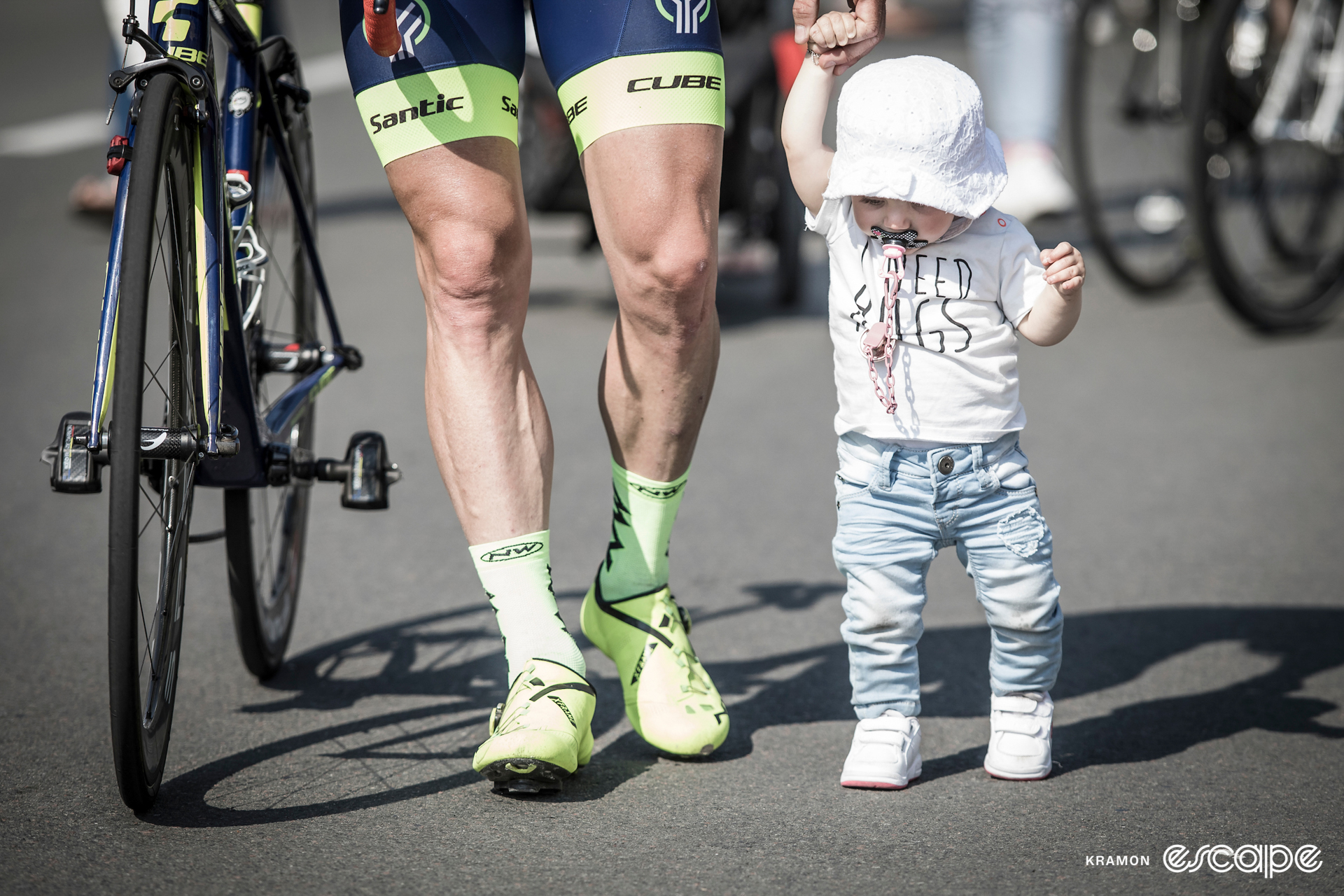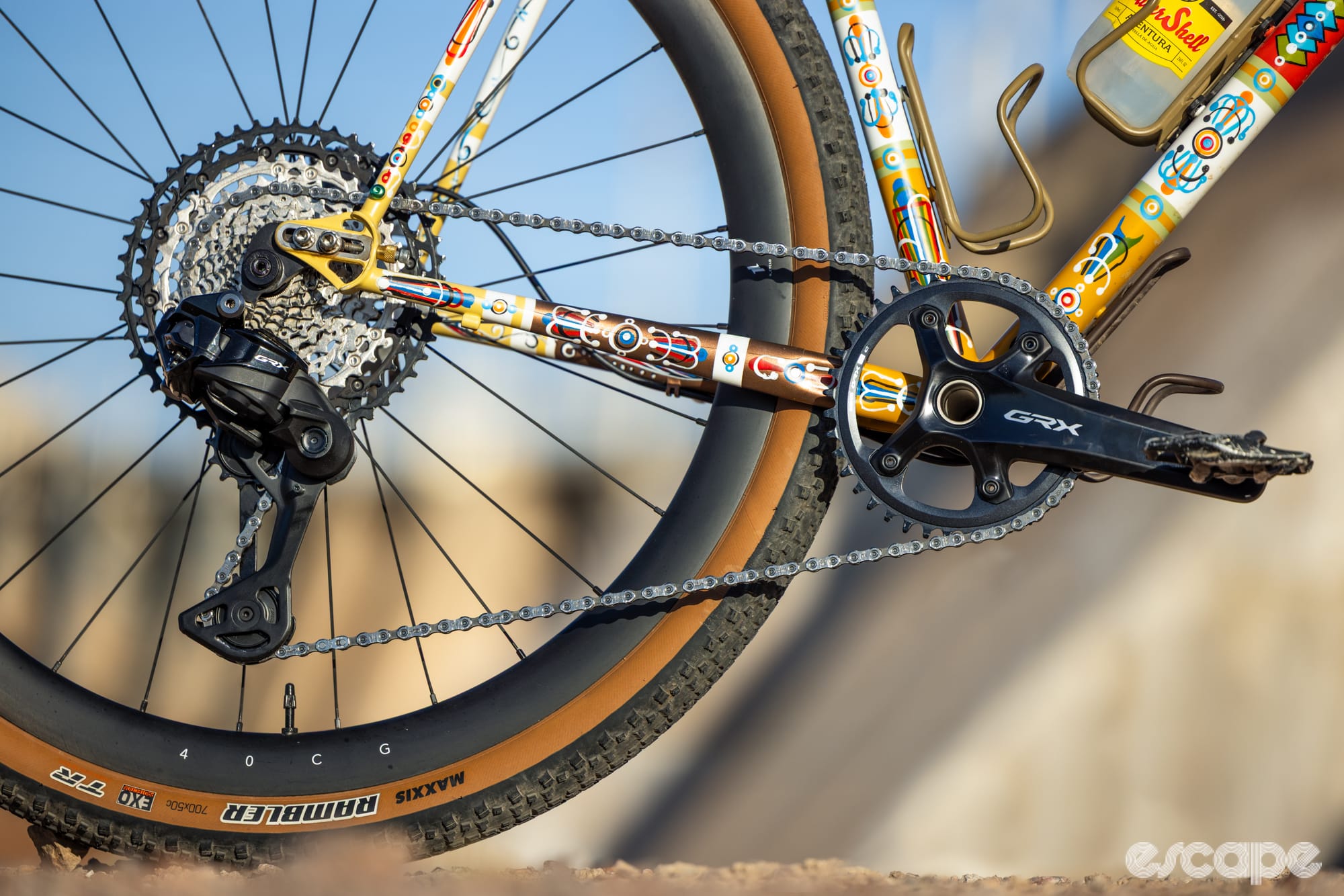It’s been one of the most encouraging trends in the professional women’s peloton in recent years – riders taking time away to have children, before returning to racing. Lizzie Deignan, Elinor Barker, Ellen van Dijk, and Chantal Van den Broek-Blaak are just some of the riders who have recently taken advantage of ever-improving employment conditions, pausing their careers in order to start a family.
Of course, things are a little different in the world of men’s professional racing. Male pros have long had children mid-career, with primary care responsibilities traditionally falling to their female partners at home.
Being away for long periods is the job of a pro racer; riders and their partners start a family knowing how things will be. But it’s far from easy. Missing large periods of a child’s formative years, missing milestone moments like birthdays, even missing a child’s birth to be at a race – all of it takes a toll.
And, as it turns out, there might be another downside to becoming a parent mid-racing career. In the immediate aftermath of having a child, the racing performance of male professional riders seems to suffer as well.
A new study
While parenthood is clearly a source of considerable joy and satisfaction for a great many, the less-positive impacts are also well-established. A mother’s physical and mental health can suffer in the weeks and months post-partum, and her career is likely to be significantly disrupted (even when good maternity leave policies are in place).
The negative impacts for fathers, while less frequently studied than for mothers (and generally less pronounced), are also well-known. Paternal health can suffer as a result of disrupted sleep, reduced testosterone levels, and reduced exercise volumes, and mental health can be affected too. But as for the effects of new parenthood on professional athlete performance, well, that’s been the subject of significantly less investigation.
With that in mind, a group of researchers out of Belgium set out to quantitatively measure whether pro cyclist performance was impacted by parenthood.
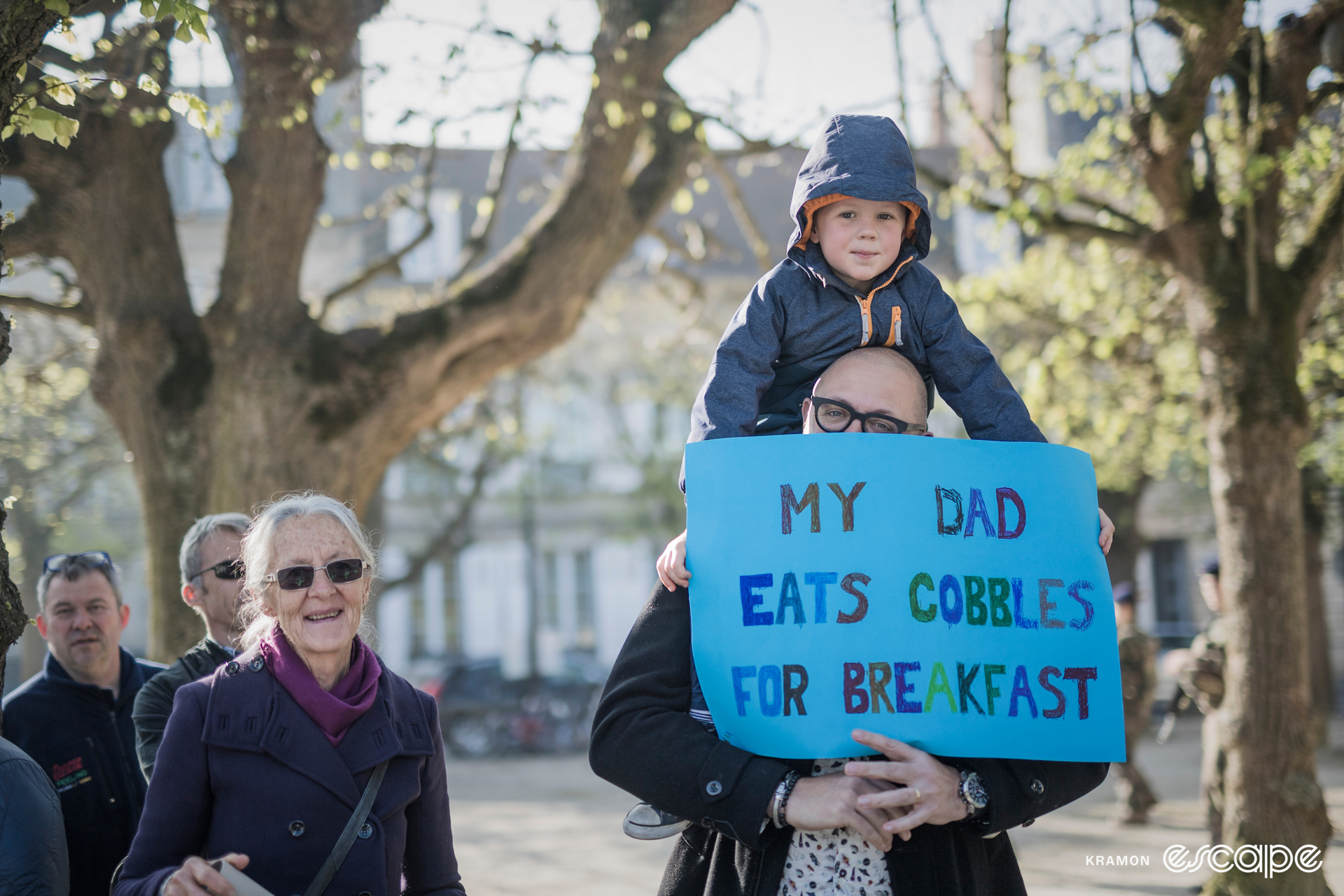
To start with, the researchers needed a metric they could use to quantify performance, and to allow them to compare that performance before and after childbirth. They opted for Cycling Quotient (CQ), “a world ranking of professional road cyclists, based on their performances during the last 12 months”, built on an old ranking system used by the UCI.
For their study, the researchers considered the end-of-season CQ rankings from 2010 through 2019 and included every male rider who finished in the top 200 on at least one occasion. From that initial selection of 645 riders, they thinned the cohort down to those who had had one or more children between 2010 and 2019.
Once they’d filtered out riders who were inactive for part of the study period – due to injury, suspension, lack of contract, or otherwise – they were left with 267 riders who, between them, had a total of 403 children.
For each of those riders, the researchers compared their performance in the 120 days immediately after the child was born, with the same period a year earlier. Why 120 days? Because while the most drastic influences of having a child manifest within six to 12 weeks after birth, a time period of 120 days allowed “sufficient comparability between two consecutive cycling seasons” (i.e. it allowed for fluctuations in the rider’s schedule). The same comparison was done for the 150 days post-birth vs the same period a year earlier, to smooth things out even further.
The study considered a bunch of variables, including:
- how many kilometres the rider raced in the relevant time periods
- their age
- whether the child was their first
- whether the rider was in their first year with the team
- whether the child was born during the off-season.
The researchers also factored in:
- each rider’s team strength, “defined as the total number of CQ points accumulated by the rider’s teammates (excluding the rider in question) over the period under study”, and
- the rider’s relative role in the team, a measure of relative leadership in the team. They defined this as the “CQ score of a rider divided by the average CQ score of his teammates during the period under study.” In the words of the researchers, this variable measures “how many times a rider is stronger than the average of his teammates over the considered period.”
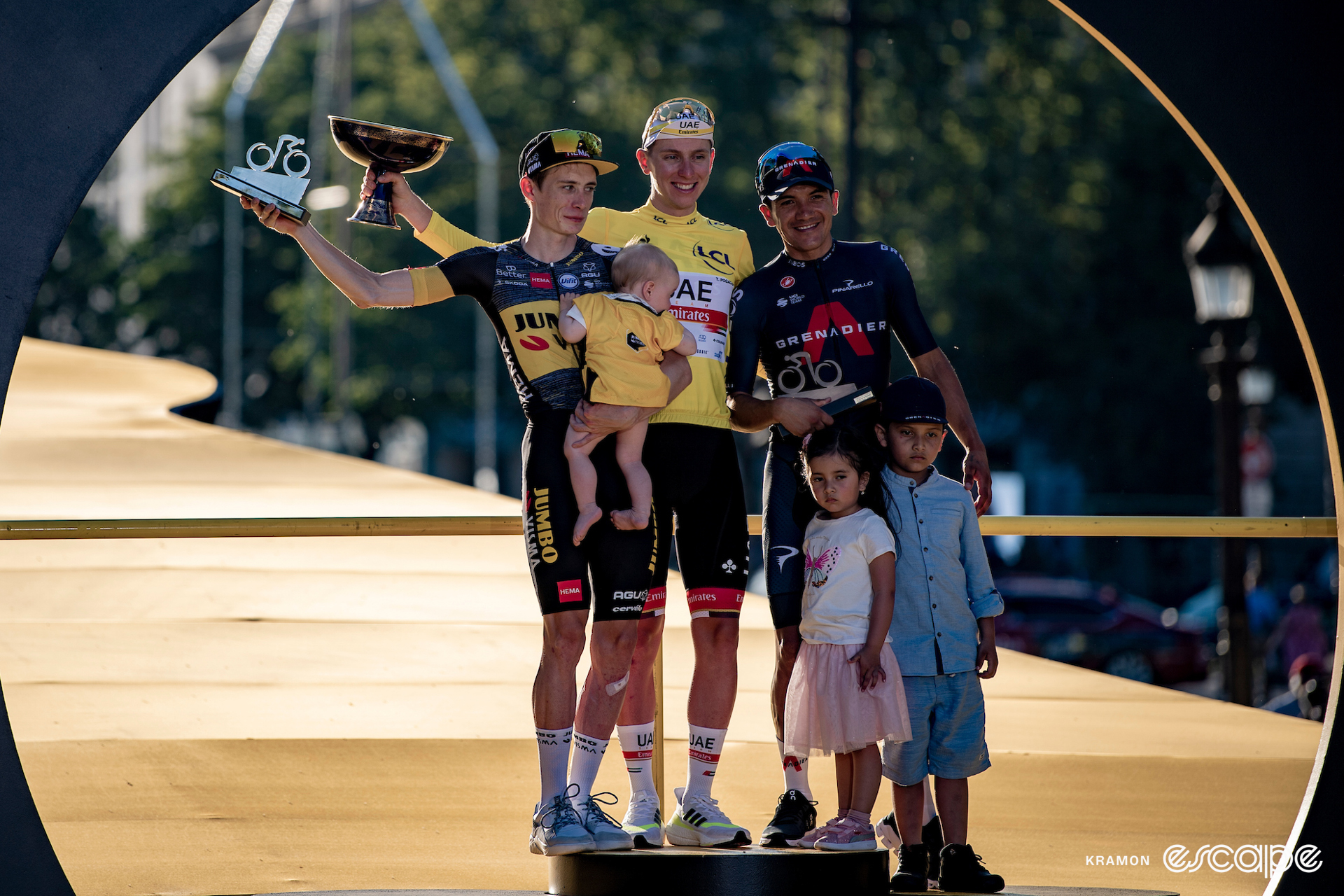
The researchers then used what they described as a “fixed effects panel data regression model” to crunch the numbers. The specifics of the process are beyond the scope of this article, but the main result of that analysis was this: having a child had a “globally negative impact … on professional cycling performance.”
More specifically, the average pro cyclist scored 21.87 fewer CQ points during the 120 days after becoming a father compared with the same period a year prior. If that child was the rider’s first, the impact was more profound – an average decrease of 39.04 points over the 120 days. As you might expect, the overall impact is lower over 150 days, but still significant: an average decrease of 18.52 points overall, and 34.88 points for a first child.
For context, the rider currently ranked 200th in the CQ rankings (Astana’s Cees Bol, at the time of writing) has 324 CQ points for the entire last 12 months. Losing 21.87 points over the course of 120 days – or roughly four months – represents a total points reduction of around 6.8% for his entire year.
Of course, the higher up that top-200 list the rider is, the less the average performance drop will affect their overall tally. The current leader of the men’s CQ rankings, Tadej Pogačar (UAE Team Emirates) has a whopping 3,485 CQ points for the past 12 months. For him, a drop of 21.87 points would only represent a 0.63% reduction in performance. Hardly a big deal.
For additional context, 21.87 CQ points is roughly the difference between:
- eighth and ninth overall in the Tour de France
- sixth and eighth in Milan-San Remo
- winning and finishing fifth in a UCI 2.1 stage race like the Tour of Austria.
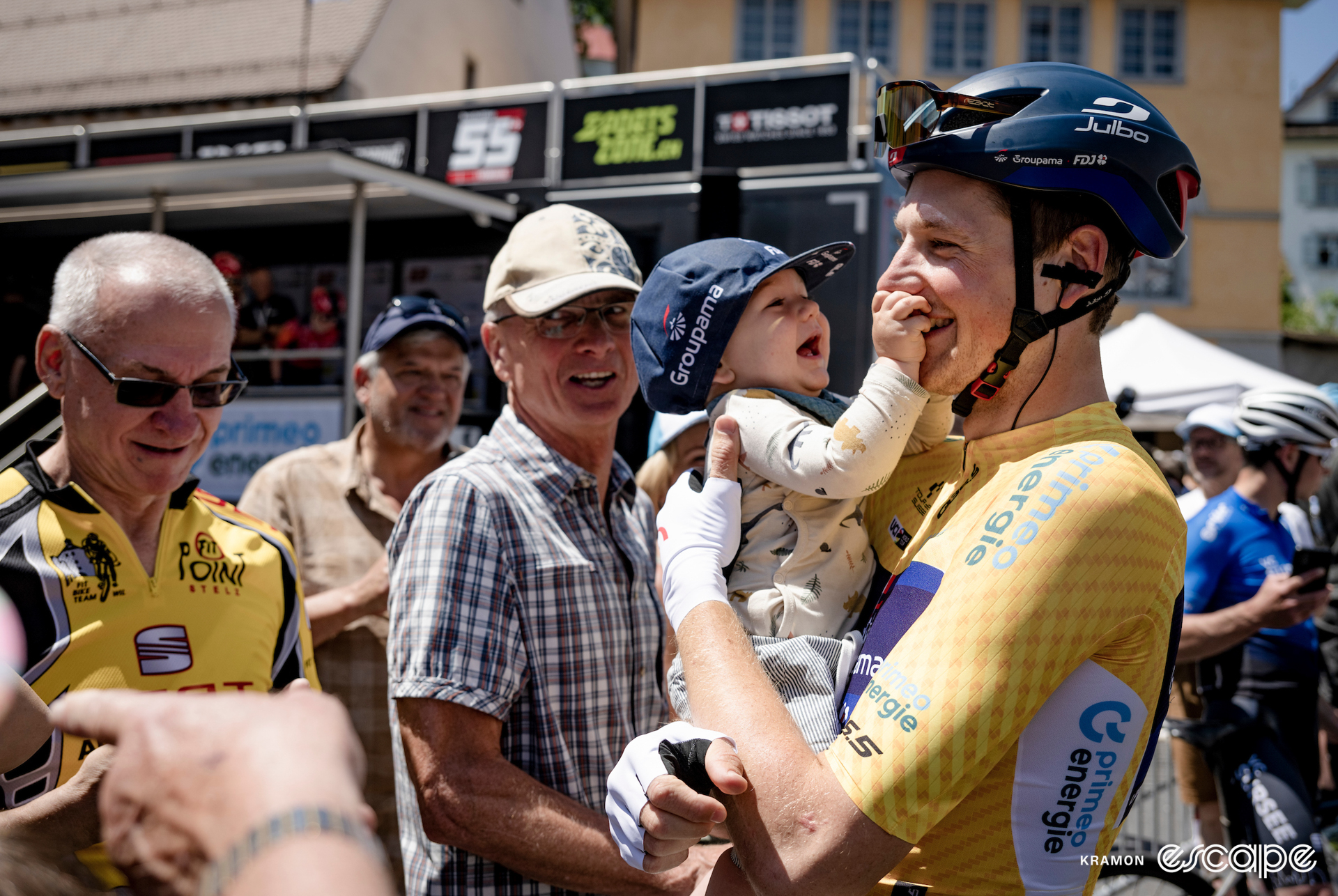
The researchers reported some other interesting findings as well. For starters, a rider’s age and whether or not it was their first year with a team didn’t prove to be significant. The strength of their team though, was found to have an impact. “A rider obtains on average 0.036 more CQ points for each extra CQ point gained by his teammates,” the researchers wrote.
The amount of kilometres raced in the 120 or 150 days had an impact as well. On average, riders scored 0.015 more CQ points per kilometre they raced in the first 120 days post-birth, or 0.017 per kilometre in the first 150 days.
On the flipside, having a child in the off-season turned out to be worse for performance than in-season. Having a child in the off-season saw riders drop an average of 32.61 CQ points over 120 days compared with 21.87 points on average across the entire cohort. That’s an interesting finding, and one that perhaps runs contrary to what you might intuitively expect.
But why?
So how can we explain the reduction in performance in the four or five months after becoming a parent? There’s a few possible explanations.
First, it’s obvious that raising children – particularly young children – leads to higher levels of fatigue, often due to sleep-loss. It’s also been shown that fathers are less likely to take risks than childless men, which could be relevant in a sport where a certain amount of risk-taking is necessary in order to be successful.
As noted earlier, men also tend to experience reduced testosterone levels during and after their partner’s pregnancy, due to hormonal fatigue. Lower testosterone levels have been shown to negatively affect athletic performance.
Finally, and assuming the rider is able to spend some amount of their child’s early months at home, it’s understandable that racing and training might temporarily take more of a back seat. It’s not uncommon to hear people talk about how work (in this case riding and racing a bike) suddenly feels a lot less important once they become parents. From a purely speculative point of view, it’s not hard to imagine this having a flow-on effect to motivation levels, and from there onto racing performance.
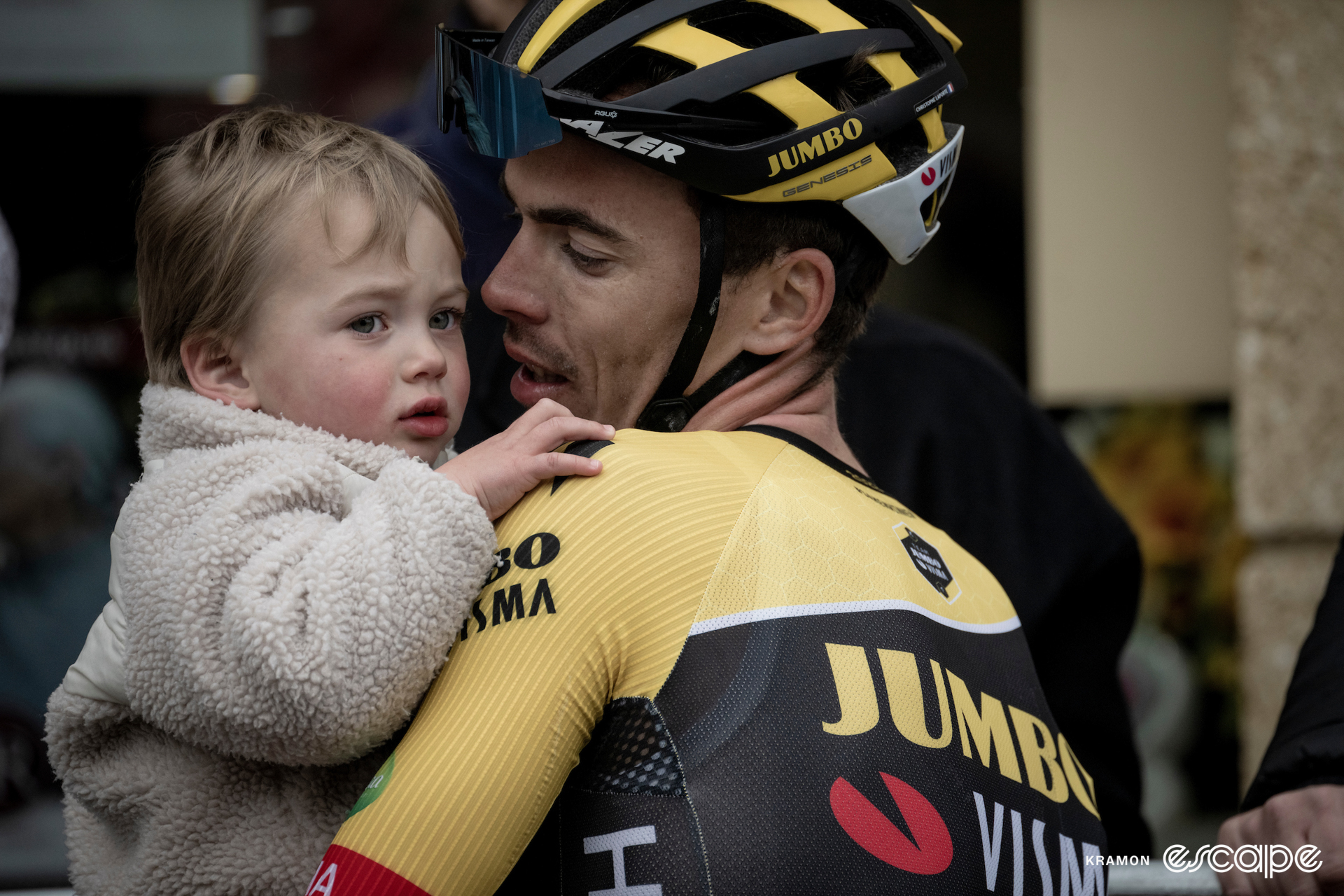
Regardless of the reasons, the researchers believe their findings are relatively clear: “having a child can negatively influence the performance of professional cyclists, and … a first child can be considered even more impactful.” Their hope is that “a better understanding of these developments can contribute to a better mental and/or sports management of professional athletes.”
As with any study, though, there are a few caveats that are worth considering.
Keep in mind
Lead researcher Anke Baetens and co are quite forthright about the shortcomings of their study. They acknowledge that there are a bunch of outliers in their collected data “which makes the interpretation of results difficult.” They also acknowledge CQ isn’t a perfect metric for representing “cycling performance” as most riders on each team aren’t riding to win or score points themselves. Indeed, domestiques “systematically sacrifice their own chances of winning to support their team leaders”, meaning a support rider’s CQ score isn’t an accurate measure of how well they performed.
The fact this study only considered the top 200 riders in the rankings, and the fact relative leadership roles were factored in, goes some of the way to alleviating this problem, but not entirely.
Given this study looks at the 120 and 150 days after a child is born (and the same period a year prior), each rider’s comparison is going to happen during a different part of the season (depending on when their child was born). With different points spreads available at different times of year, and with different riders having different strengths and form peaks throughout the season, the lack of consistency between riders is an unavoidable shortcoming of this study.
But perhaps the biggest weakness of this research comes from the fact that professional cycling is an inherently variable and dynamic sport. Very few riders perform at a consistent level from year to year. Injury, illness, team dynamics, confidence, happiness, the evolution of racing calendars – these are just some of the multitude of factors that can affect whether a rider is successful or not. Having a child, while certainly significant in its impact, is only one of many factors to be considered.
And while the researchers did account for some variables – team strength, age, whether it was the rider’s first year on the team or not – it’s impossible to account for all the variables that determine cycling performance, and therefore accurately compare like with like from one year to the next.
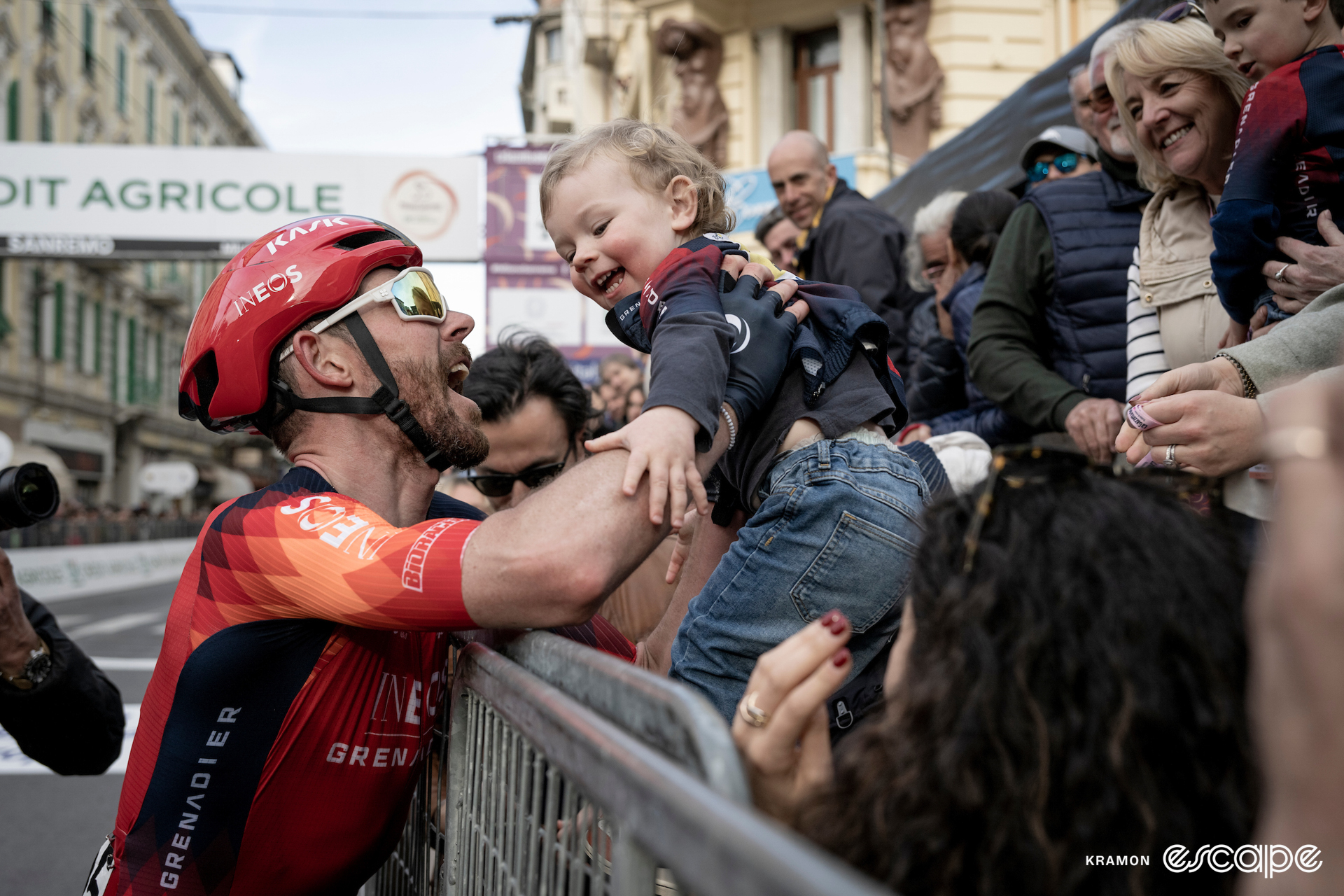
The bigger picture
Let’s assume for a moment that the results of this study are accurate; that, regardless of the study’s shortcomings, it accurately reflects how having a child impacts racing performance. Even then, the impact seems to be relatively minor in both absolute and relative terms.
In concluding their study, the researchers talk about the possibility of an interesting follow-up study – a qualitative investigation in which riders are interviewed and asked about the real-world effects of parenthood. The results from that study would likely highlight that while racing performance is obviously important to pro racers (and their team management), it’s only one part of a much bigger puzzle.
Indeed, an excellent feature article from GCN’s Matilda Price at the end of 2023 revealed many of the attitudes that such a study would surely reveal. Of the multiple pro-cyclist-fathers Price interviewed for her story, none highlighted drops in performance as a major concern. Instead, they spoke more about the difficulty of being away from home for long stretches, of missing formative periods, of the desire to get home whenever possible, and of the need to make the most of any time away from family. Jack Haig (Bahrain Victorious) had a similar attitude when speaking to Escape earlier this season. While being away from home is an indelible part of the pro cyclist experience, the impact on family life should not be discounted.
Of course, let’s not forget that having a child mid-racing career has an even greater impact for professional female cyclists, even if the UCI and teams are making it increasingly possible for that to happen.
Hopefully there’s already some research in the works looking at the impact of returning to the pro women’s peloton after giving birth. The sample size is small at the moment – certainly smaller than the parent cohort in the professional men’s peloton – but with any luck, that group will only continue to grow in the years to come.
Did we do a good job with this story?

